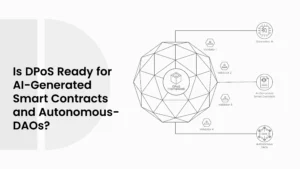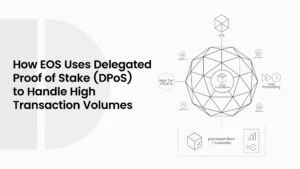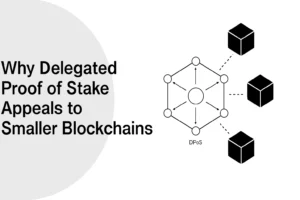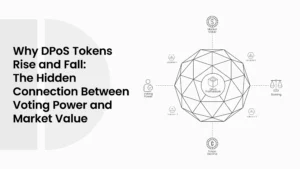How NFTs Could Shape the Future of DPoS Governance Through Reputation-Based Voting
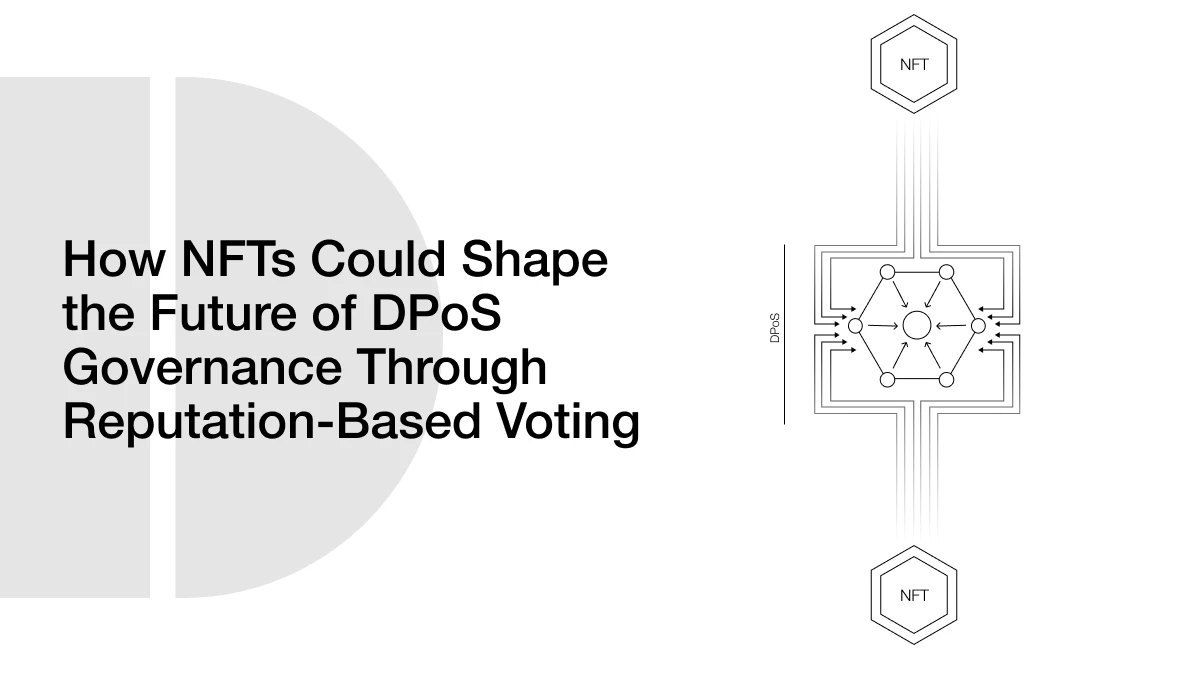
NFTs started as digital art. People bought and sold them like trading cards. But now, they’re becoming something bigger. NFTs are slowly moving into areas like identity, voting, and even how blockchains are run. One new idea in this space is called Reputation NFTs. These special NFTs show your behavior, history, and trust inside a blockchain network. Think of them like a badge or scorecard. If you’re a good participant, someone who votes honestly, runs a reliable node, or supports the network, you might earn a Reputation NFT. And this idea could change how blockchain systems are governed.
- What Are Reputation NFTs?
- Why Does This Matter?
- Use Cases for Reputation NFTs
- What Is DPoS Governance? (And Why It Needs Trust Layers)
- How Does DPoS Work?
- This Is Where Trust Layers Come In
- How Reputation NFTs Can Improve DPoS Systems
- Key Use Cases of Reputation NFTs in DPoS
- Real Example: Picking a Validator
- Implementation Ideas
- Benefits of Using Reputation NFTs in Blockchain Voting
- Builds Trust in the System
- Increases Accountability
- Encourages Long-Term Participation
- Makes Governance Fairer Than Ever
- Opens the Door to Better Tools and Metrics
- Challenges to Watch Out For
- 1. Privacy Concerns
- 2. Gaming the System
- 3. No Shared Standards (Yet)
- 4. On-Chain Storage Costs
- The Future of DPoS Governance with Reputation NFTs
- What Could Change?
- What Might This Look Like?
- Conclusion
- Frequently Asked Questions (FAQs)
- Glossary of Key Terms
Right now, many blockchains use Delegated Proof of Stake (DPoS) to stay secure. In simple words, DPoS is a system where people vote for leaders (called validators) who keep the blockchain running. But there’s a big problem: it’s hard to know who to trust. Validators can be good one day and bad the next. Voters might not have any real information to make an informed choice. That’s where Reputation NFTs come in. They could make it easier to see who’s been helpful, who’s been harmful, and who deserves your vote. By adding this layer of trust and transparency, Reputation NFTs might fix many of the issues DPoS systems face today.
In this article, you’ll learn what Reputation NFTs are, how they work, and how they could shape the future of blockchain governance, especially in DPoS models. If you’ve ever wondered how blockchains could become fairer, honest, and trustworthy, this one is for you.
What Are Reputation NFTs?
Reputation NFTs are a new kind of NFT that show how trusted or helpful someone is in a blockchain system. Unlike normal NFTs that you can sell or trade, Reputation NFTs are non-transferable. That means once you earn it, it stays with you. You can’t buy or sell it like a picture or game item. It’s linked to your personal actions on the blockchain.
ALSO READ: Is This the Future of Blockchain? The Impact of AI Bots on Voting in DPoS Systems
If you vote regularly, help run the network, or follow the rules, you might earn a high-reputation NFT. But if you cheat, lie, or try to attack the system, your reputation score could go down. These NFTs are stored on the blockchain, so everyone can see who’s been honest and who hasn’t.
Why Does This Matter?
In most blockchain systems today, everyone can vote or take part, but there’s no easy way to know who’s trustworthy. A new user can appear, vote badly, harm the network, and leave without anyone knowing. This is a problem, especially in Delegated Proof of Stake networks where users vote for validators.
Reputation NFTs fix this by giving people a digital track record. You can see how often someone has voted, how well a validator has performed, or whether someone has tried to harm the system in the past. It’s like checking someone’s online review before trusting them.
Use Cases for Reputation NFTs
1. Voting Rewards
If you vote in every round of a DPoS election, you could earn a “Good Voter” NFT. This badge shows you’re an active and trusted participant.
2. Validator Performance
Validators who never miss blocks and always tell the truth could earn Reputation NFTs that show they’re reliable. This helps voters choose them in the next round.
3. Community Contributions
Developers, translators, or users who help grow the network (even without voting or validating) could be awarded NFTs that show their contribution to the project.
4. Fraud Protection
If someone tries to vote twice or break the rules, their NFT history might show a drop in score or receive a “Violation” badge. This helps others avoid bad actors.
What Is DPoS Governance? (And Why It Needs Trust Layers)
Before understanding how Reputation NFTs can help, let’s first explain how Delegated Proof of Stake governance works. DPoS stands for Delegated Proof of Stake. It is a form of blockchain network in which individuals cast their votes to elect a few individuals, known as validators, who operate the network.
These validators execute important functions that include validating transactions, checking blocks, and ensuring the security of the blockchain. However, rather than all the people doing this work (as in Proof of Work or traditional Proof of Stake), only a small number of validators are selected by voters. That makes the network quicker and economical.
How Does DPoS Work?
Let’s say there are 100,000 users on a blockchain. Instead of all 100,000 trying to confirm every transaction, they vote for 20 validators to do the work. Those validators take turns adding new blocks to the chain. If they do a good job, they get rewards. Some of that reward goes back to the voters who supported them.
What’s the problem?
The system depends a lot on trust. Voters need to pick the right validators: honest ones who don’t cheat, go offline, or take bribes. But how do you know who’s good and who’s not?
- What if a validator promises good behavior but lies?
- What if a voter picks someone just because they’re popular, not because they’re trustworthy?
- What if bad actors keep creating new accounts to cheat the system?
Right now, DPoS has no built-in way to track who’s behaved well in the past. Voters often make choices with little information. That can lead to bad decisions, unfair rewards, and even attacks on the network.
This Is Where Trust Layers Come In
To fix these problems, DPoS needs something called a trust layer. This is a way to prove reputation without guessing. Reputation NFTs can be that trust layer. They help everyone see who’s been honest, who’s done the work, and who deserves support.
Instead of voting blindly, users could check someone’s reputation badge first. If a validator has earned multiple “Reliable Validator” NFTs, they’re likely to be a safe choice. Reputation NFT would also reveal a person’s history of missing votes or breaking the rules.
In short, DPoS is a fast and efficient system, but it only works well if the right people are chosen. Reputation NFTs give voters the tools they need to make better choices.
How Reputation NFTs Can Improve DPoS Systems
Reputation NFTs can make Delegated Proof of Stake (DPoS) systems more honest, more transparent, and fairer. Right now, most DPoS blockchains don’t track a user’s history or behavior in a clear way. Anyone can vote. Anyone can become a validator. But no one really knows who’s been reliable over time.
Reputation NFTs fix this by turning good behavior into visible rewards and bad behavior into public records. This makes it easier for the community to see who they can trust.
ALSO READ: Breaking Down DPoS Architecture: From Block Creation to Governance Cycles
Here’s how Reputation NFTs can help improve different parts of DPoS governance:
Key Use Cases of Reputation NFTs in DPoS
| Feature | Problem Today | How Reputation NFTs Help |
| Transparent Voting History | No easy way to see how voters behave or how often they participate | Reputation NFTs can show a user’s full voting record and consistency |
| Honest Validator Performance | Validators can lie about uptime or reliability | Good validators earn NFTs proving strong uptime, correct blocks, and fair behavior |
| Sybil Attack Resistance | Bad actors can create fake accounts to gain voting power | NFTs are non-transferable and reputation-linked, so fake accounts can’t fake trust |
| Rewarding Positive Behavior | Helpful users often go unnoticed | Voting, staking, or contributing can earn NFTs that boost social status |
| Penalizing Misconduct | Validators who go offline or act badly may still get re-elected | Reputation NFTs can show slashing events, downtime, or fraud attempts |
| Community Decision Making | Voters don’t have the tools to make informed choices | Users can vote based on someone’s reputation history, not guesswork |
Real Example: Picking a Validator
Imagine you’re choosing someone to vote for in a DPoS election. There are two candidates:
- Validator A has a Reputation NFT showing 99.9% uptime, zero slashes, and 3 years of honest performance.
- Validator B is new and has no track record.
Who would you vote for?
Most people would choose Validator A, because they’ve earned trust with proof. This is the power of using NFTs in governance. It’s no longer just about promises or popularity. It’s about reputation, you can see.
Implementation Ideas
- Voting NFTs: Earned when a user votes consistently and on time.
- Validator NFTs: Given to validators who perform well, have no slashing, and help the community.
- Penalty NFTs: Mark accounts that break the rules or try to cheat.
- Support NFTs: Given to users who report bugs, help in forums, or build tools.
Over time, all these badges build a kind of “blockchain résumé.” It’s a new way of showing trust, without needing to know someone personally.
Benefits of Using Reputation NFTs in Blockchain Voting
Reputation NFTs aren’t just a cool idea. They solve real problems in blockchain voting systems, especially in Delegated Proof of Stake (DPoS). These NFTs can build trust, stop cheating, and make governance fairer for everyone.
Let’s look at the main benefits:
Builds Trust in the System
In today’s DPoS blockchains, it’s hard to know who to vote for. People might vote based on rumors, big promises, or just social media followers. But Reputation NFTs give you the facts.
If someone has a record of good behavior, their NFT will prove it. This builds trust between voters and validators.
Example: If you see a validator with 5 “Reliable Node” NFTs on TRON network, you know they’ve done their job well for a long time.
Increases Accountability
With Reputation NFTs, everyone is watched by the system, not by people, but by code. If you act badly, skip your duties, or vote in shady ways, your reputation score drops.
Validators can no longer get away with being inactive or dishonest. They have to stay responsible or risk losing votes.
Why it matters: Blockchain should be trustless but still needs ways to punish bad behavior. Reputation NFTs offer that without requiring a central authority.
Encourages Long-Term Participation
At this moment, there are lots of voters who cast only one vote and leave. Others just confirm when there is a high reward. However, reputation systems do not only reward instant gains.
When users realize that they can gain reputation with time, they will tend to remain active and helpful. This strengthens the entire network.
Example: You might earn a Reputation NFT that grows in value as you vote in more rounds. It’s like leveling up in a game.
Makes Governance Fairer Than Ever
Wealthy users often control voting today. They can use big wallets to push their favorite validators to the top, even if those validators aren’t honest.
Reputation NFTs balance that out. A small voter with great history might carry more influence than a big wallet with zero trust.
That means quality over quantity. It’s not just about money; it’s about being a reliable, helpful user.
Opens the Door to Better Tools and Metrics
Once blockchain networks start using Reputation NFTs, they can build new dashboards, charts, and filters. Voters could sort validator candidates by:
- Highest reputation
- Most consistent uptime
- Least slashes
- Community support
This kind of transparency leads to smarter voting decisions.
| Benefit | What It Means |
| Trust | Users can see honest behavior, not just promises |
| Accountability | Bad actions are recorded and shown to others |
| Long-Term Involvement | Users are rewarded for staying active and helping over time |
| Fair Governance | Good behavior matters more than just money or fame |
| Smarter Voting Tools | Blockchain projects can build tools using visible reputation data |
Challenges to Watch Out For
Reputation NFTs can bring significant benefits to blockchain governance. But they also come with risks. Before projects start using them in Delegated Proof of Stake systems, they need to think carefully about these challenges.
1. Privacy Concerns
Reputation NFTs are public. That’s how they build trust. But this could also hurt people’s privacy. If your voting behavior or network actions are always visible, it might feel like surveillance.
Some users may not want their activity to be tracked forever. DPoS projects will need to balance transparency with user safety.
2. Gaming the System
People always find ways to cheat. Some users might try to:
- Farm a good reputation using fake accounts
- Bribe others for votes
- Use bots to earn badges
If Reputation NFTs are easy to trick, they become useless. So systems need good rules and maybe even AI tools to watch for fake behavior.
3. No Shared Standards (Yet)
Right now, every project is doing its own thing. Some use NFTs; others use scores or badges. Without a shared system, it’s hard to use one reputation score across multiple blockchains or tools.
If DPoS chains want to use Reputation NFTs, they need to agree on what counts as good or bad behavior and how to measure it.
4. On-Chain Storage Costs
NFTs live on the blockchain. Storing large amounts of behavioral data can get expensive and slow down the network. If everyone’s vote history becomes part of an NFT, it may clog the system.
Projects will need to find smart ways to store only the key info or use off-chain storage with on-chain proofs.
The Future of DPoS Governance with Reputation NFTs
Right now, DPoS systems rely primarily on votes and token counts. But what if in the future, they rely on something deeper, your on-chain reputation?
Reputation NFTs could change how leaders are chosen, vote on proposals, and run blockchains. Instead of just voting with tokens, people could vote with trust. That means validators won’t win because they’re rich or famous; they’ll win because they’ve proven themselves over time.
What Could Change?
- Validators with good track records (as evidenced by their NFTs) would get more votes.
- Voters with a history of helping the network might get more voting power or rewards.
- People could lose their reputation for spamming, cheating, or staying inactive.
This creates a system where your past matters. It rewards long-term commitment, not just short-term profits.
What Might This Look Like?
Imagine logging into your DPoS dashboard. You see:
- Your Reputation NFT showing “Active Voter – 24 rounds”
- A validator’s NFT badge: “100% Uptime – 1 Year Straight”
- A list of validators with red flags for missed blocks or slashing penalties
You can now vote smartly, based on data, not just guesswork.
Conclusion
We have progressed from digital coins and smart contracts to on-chain identity and trust. Reputation NFTs are a big part of this next step. They give us a new way to see and reward good behavior. In Delegated Proof of Stake, they bring fairness, make the system harder to cheat, and help voters make better choices.
Of course, there are challenges—privacy, gaming, and standards—but those can be solved with smart design and collaboration. Ultimately, the world could transition to a realm where your on-chain reputation holds greater power than the size of your wallet. A world where trust is earned, not bought. And that’s what makes these NFTs one of the most exciting ideas in blockchain governance today.
Frequently Asked Questions (FAQs)
- What are Reputation NFTs?
Reputation NFTs are non-transferable digital tokens that show a user’s behavior and trust level on a blockchain. They can’t be sold and are earned through actions like voting or validating.
- How do these NFTs help DPoS systems?
They give voters and validators a way to prove their performance, making it easier to reward good actors and avoid dishonest ones in Delegated Proof of Stake systems.
- Can Reputation NFTs be traded like normal NFTs?
No, they’re non-transferable. You can’t sell or buy them. They stay with the person who earned them.
- Are any blockchain projects using such NFTs now?
Yes. Projects like Soulbound Tokens (SBTs), Lens Protocol, Kleros, and Gitcoin Passport are early examples exploring this concept.
- What are the risks of using Reputation NFTs in governance?
Main risks include privacy concerns, people trying to game the system, and the lack of shared standards for measuring reputation.
Glossary of Key Terms
| Term | Simple Definition |
| NFT (Non-Fungible Token) | A unique digital item on the blockchain that proves ownership of something (art, items, etc.) |
| DPoS (Delegated Proof of Stake) | A voting system where users pick a small group of leaders (validators) to run the blockchain |
| Validator | Someone chosen by voters in a DPoS system to approve and add new blocks |
| Reputation NFT | A non-transferable NFT that shows a person’s trust level or past actions |
| Soulbound Token (SBT) | A type of NFT that is tied permanently to a person or account and can’t be moved or sold |
| Sybil Attack | A type of cheat where one person creates many fake accounts to gain unfair advantage |

